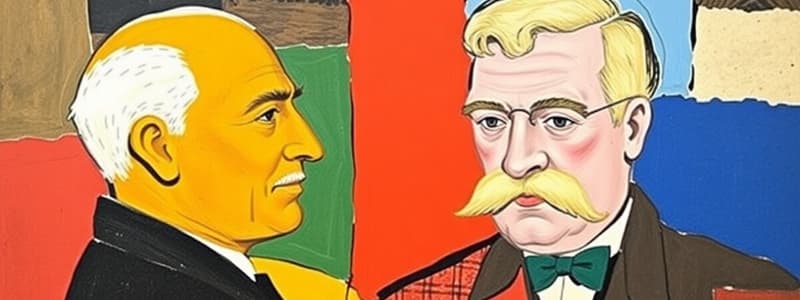Podcast
Questions and Answers
An welchem Datum und um welche Uhrzeit wurde der Klausur Merkzettel erstellt?
An welchem Datum und um welche Uhrzeit wurde der Klausur Merkzettel erstellt?
- Dienstag, 18. Oktober 2023, 15:00
- Dienstag, 17. Oktober 2023, 14:01 (correct)
- Sonntag, 15. Oktober 2023, 13:00
- Montag, 16. Oktober 2023, 14:01
Welches Fach wird in dem Klausur Merkzettel erwähnt?
Welches Fach wird in dem Klausur Merkzettel erwähnt?
- Literatur
- Geschichte (correct)
- Mathematik
- Biologie
Was zeigt der Inhalt des Klausur Merkzettels?
Was zeigt der Inhalt des Klausur Merkzettels?
- Wichtige Informationen zur Geschichtsklausur (correct)
- Eine Wasseraufnahmeanalyse
- Eine Liste von Literaturempfehlungen
- Eine Zusammenfassung von Regeln für schriftliche Prüfungen
Wie viele Seiten umfasst der Klausur Merkzettel?
Wie viele Seiten umfasst der Klausur Merkzettel?
Welches Datum folgen auf den ersten Seiten des Klausur Merkzettels?
Welches Datum folgen auf den ersten Seiten des Klausur Merkzettels?
Flashcards
Klausurdatum
Klausurdatum
Die Klausur findet am Dienstag, den 17. Oktober 2023 statt.
Klausurzeit
Klausurzeit
Die Klausur beginnt um 14:01 Uhr.
Klausurfach
Klausurfach
Das Fach der Klausur ist Geschichte.
Klausurraum
Klausurraum
Signup and view all the flashcards
Klausurstoff
Klausurstoff
Signup and view all the flashcards
Study Notes
Bismarck's Policies and the Unification of Germany
- Bismarck, Prussian Prime Minister (1862), played a crucial role in unifying German states.
- The Unification Wars (1864-1871) involved three key conflicts:
- Austro-Prussian War (1866): Dispute over Schleswig-Holstein administration led to Prussia defeating Austria, dissolving the German Confederation, and establishing the North German Confederation.
- Franco-Prussian War (1870-1871): A conflict triggered by the Hohenzollern candidature for the Spanish throne. The Ems Dispatch, manipulated by Bismarck, inflamed tensions, ultimately resulting in a Prussian victory.
- Danish War (1864): Prussia and Austria defeated Denmark, controlling Schleswig and Holstein.
German Unification and the Constitution of 1871
- The Prussian victory in the Franco-Prussian War led to the unification of German states into the German Empire (1871).
- Wilhelm I, King of Prussia, became the first German Emperor in 1871 at Versailles.
- Bismarck became the first Chancellor of the German Empire.
- The constitution established a constitutional monarchy, balancing the power of the Emperor with the Reichstag (parliament).
Bismarck's Domestic Policies
- Bismarck aimed to strengthen the Prussian monarchy.
- His policies targeted perceived internal enemies (Catholics and Social Democrats) through suppression tactics.
- Example measures included:
- Kulturkampf (struggle for culture): Measures aimed at reducing Catholic Church influence.
- Socialist Laws: Repressed socialist groups perceived as a threat.
- Social insurance reforms (1883 onward): Introductions of sickness, accident, and old age/invalidity insurance, despite opposing social democratic ideals.
Bismarck's Foreign Policies
- Bismarck's foreign policy aimed to isolate France and maintain peace in Europe.
- Key aspects of his foreign policy included:
- Alliance System: Creation of alliances to maintain peace. Example alliances include:
- Dreikaiserbund (League of the Three Emperors, 1873): Aimed at establishing a balance of power between the German empire, Austria, and Russia.
- Zweibund (Dual Alliance, 1879): Agreement between Germany and Austria-Hungary.
- Dreibund (Triple Alliance, 1882): Pact between Germany, Austria-Hungary, and Italy.
- Reinsurance Treaty (1887): Secret treaty between Germany and Russia to avoid confrontation. This treaty was crucial, but eventually dropped.
- Alliance System: Creation of alliances to maintain peace. Example alliances include:
Key Dates and Alliances
- 1864: Austro-Prussian victory over Denmark
- 1866: Austro-Prussian War - Prussian victory
- 1870-1871: Franco-Prussian War - Prussian victory
- 1871: Proclamation of the German Empire
- 1871: Bismarck becomes first Chancellor; German constitution introduced
- 1873: Dreikaiserbund
- 1879: Zweibund
- 1882: Dreibund
- 1887: Reinsurance Treaty
Map Notes
- A map shows the German states before and after unification.
- A particular map shows the North German Confederation.
- Another map shows the progression and formation of the German Empire.
- Major European powers and their relationships are depicted, suggesting regional dynamics and alliances.
Studying That Suits You
Use AI to generate personalized quizzes and flashcards to suit your learning preferences.
Related Documents
Description
Dieses Quiz behandelt Otto von Bismarcks entscheidende Rolle bei der Einigung Deutschlands im 19. Jahrhundert. Es umfasst die Unificationskriege zwischen 1864 und 1871 und die Gründung des Deutschen Kaiserreichs. Teste dein Wissen über die wichtigsten Ereignisse und politischen Strategien dieser Zeit.




